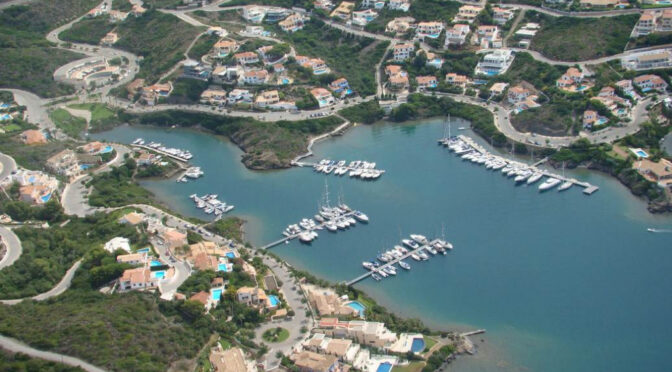Views: 832
Four years of paralysis for ignoring the environmental laws
In Cala Corb, on the southern pavement of the Port of Maó works for connecting the pavement with the Moll d’en Pons, have been stopped for four years.
The reason was that the procedure used by the Port Authority awarded work consisting of a cantilevered walkway and suddenly, without any formalities or prior authorisation, it was turned into a construction dock with dozens of trucks emptying rocks into the sea.
A cantilevered walkway attached to the rock-face has hardly any effect on the marine environment, but, obviously, tons and tons of rocks being poured into the sea will transform its environment radically.
Any land subject to European laws, for some decades past, before causing such a transformation such as this, first commissions an environmental impact study, to know what values exist and to see if things can be done in such a way that cause the least loss of natural values.
A significant environmental impact
However, the Port Authority maintains that, as Maó is a State port, the environmental impact law does not apply, it has validity, they say, only in areas that have regional jurisdiction.
State regulation, however, is applicable over protected species. So, if works end up affecting a protected species, then there is a cumbersome terrain of reports, potential sanctions and specific authorisations. This is what has occurred at Cala Corb.
The dumping of rocks without control seriously affected a colony of protected coral that has been practically devastated. Had this been done by an individual, they would have been fined and in danger of being prosecuted through criminal channels.
Before a fait acompli, it was necessary to wait for a resolution from the corresponding ministerial department that had undertaken to contract a scientific service to move the remains of the coral to another part of the Maó port. Four years of paralysis and added costs for not wanting to realise that environmental laws are the same as others.
A new threat to the northern walkway: works and desalination plants
Recently, the Port Authority has put the management out to tender of the moorings by the northern walkway (the area known as s’Altra Banda) as well as those attached to the Isla del Rey.
Having consulted the specifications it can be deduced that whoever takes on the concession could significantly increase the number of moorings and, consequently, the areas where new installations could be put. To the 390 moorings that there are now, could be added another 250.
This intention contradicts two important points. In the first place, it implies adding a large number of new boats when Menorca has a study of the nautical load capacity of the island that was already saturated more than 10 years ago.
The second point is that it means altering new areas where no studies of the natural values have been presented.
The tender specifications also allow for installing various small desalination plants to provide water for the boats. But, there is no explanation for what is planned for the salt water generated by the desalination plants and it is not necessary to be very perceptive in deducing that it will be poured into the port itself which will significantly alter the natural environment.
The Port of Maó is a natural port
The large marine area that provides safe anchorage for Maó is a natural port that houses protected species and that offers important biological functions. The dynamic that tries to continue growth each year with new infrastructures and, furthermore, without doing previous studies on any environmental impact, serves to provide the basis for new environmental conflicts.
GOB has asked that any new pontoons are constructed with a system of “piles and fingers” (rather than with concrete blocks and chains) in order to better protect the seabed. They also requested that priority on waiting lists for a mooring be given to boats of traditional construction, with sail or electric drive motor.
It was also requested that no increases be made for moorings near areas where there is seafood, since water in a good condition is required and it is important to maintain economic diversification within the port.
Acting with a vision for the future
The proposal from GOB is that the orientation of the Port of Maó is focussed on improving the quality of its nautical services as well as improving shipyard boat maintenance and not on increasing the number of boats in the sea.
The level of the nautical saturation now seen in many of the coves during the summer, as well as the need to recover environmental values that have been lost due to excesses committed in the last decades, leads us to ask for a new commitment that is not based on quantity but on quality.

